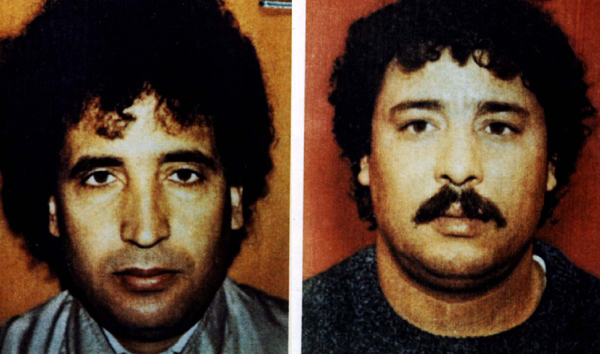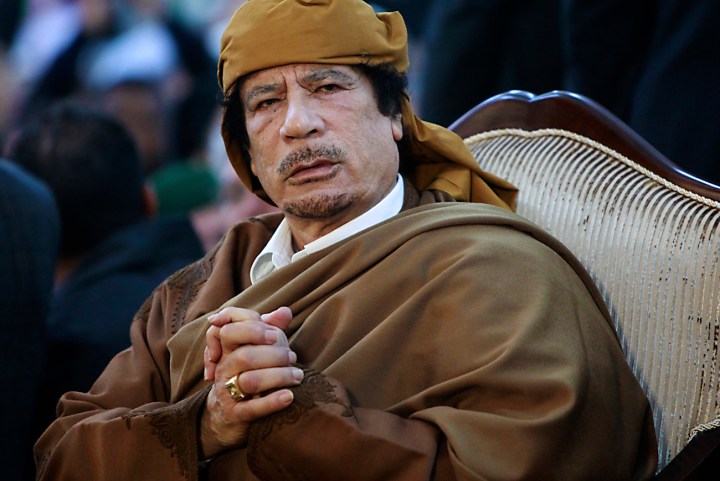At precisely 2:00 local time, on the clear morning of 15 April 1986, Libya became the focal point of an undertaking called Operation El Dorado Canyon. Lasting all of 11 minutes El Dorado Canyon was the most intricately choreographed bombing run in the 70-year history of the art - a great airborne armada to provide a “measured response” to the extracurricular antics of a man US President Ronald Reagan dubbed “the mad dog of the Middle East”. One Muammar Abu Minyar al-Gaddafi, Brotherly Leader and Guide of the Revolution, hereafter referred to as The Colonel. By RICHARD POPLAK.
The focal point of El Dorado Canyon was the fortified compound al-Aziziyah, in which The Colonel kept a gilded private residence. It was bombed mercilessly in a much larger version of Castro’s exploding cigar. The Colonel had read the tea leaves (as well as the newspapers, which published several leaked reports about an upcoming “surprise” raid) and had slunk off to safer climes. He nevertheless made the curious decision to leave behind his adopted baby daughter Hanna. Along with 36 other Libyans, she didn’t make it through the night.
Known principally for his pan-Arabic rhetoric, penchant for gold-plated AK-47s, his considerable bouffant and facial hair that made Yasser Arafat look well-groomed, The Colonel scrambled to power in a 1969 coup and rose to subsequent infamy as the world’s numero uno state sponsor of international terrorism. A week prior to Operation El Dorado Canyon, a suitcase bomb exploded in a Berlin discotheque called La Belle, killing two US servicemen and a Turkish woman, injuring a further 229. This was one in a long line of similar atrocities, perpetrated in an age before such things became the ubiquitous bric-a-brac of the daily news wires. With La Belle, The Colonel had finally been caught with his hand in the grenade jar.
Said Reagan of El Dorado Canyon: “[Gaddafi] counted on America to be passive. He counted wrong. I warned that there should be no place on Earth where terrorists can rest and train and practice their deadly skills. I meant it. I said that we would act with others, if possible, and alone if necessary to ensure that terrorists have no sanctuary anywhere. Tonight, we have.” El Dorado was meant to kill The Colonel; it very nearly did. Ultimately, it has come to represent his remarkable ability to beat the odds and remake himself in the light of a changing international climate.
Watch: Reagan bombs Libya (1986):
The Colonel’s 43-year path through the geopolitical maelstrom, currently facing unprecedented challenges from waves of Libyan protests, has been anything but boilerplate African/Arabian dictator. Born into a Bedouin family near the town of Sirt in 1942, The Colonel rose quickly through the Libyan army, and featured as the major conspirator in a plot to overthrow the sitting monarch, King Idris, who was widely considered to be an Italian puppet and a hangover of the bitter years of colonialism.
The experience of living under the Italian elite served to radicalise young Libyans like Gaddafi. In 1956, The Colonel – easily Egyptian leader Gamal Nasser’s biggest 14-year-old fan – marched in a pro-Palestinian rally in Suez, and fully bought into the socialist pan-Arabism Nasser was preaching at the time. A fiery speaker, the whip-thin army hack preached his way up through the Libyan ranks, and found himself at the tip of the spear of the coup d’etat that sent the monarchy packing.
When he came to power, Gaddafi made a great show of modesty, and insisted that Libya would become a “jamahiriya” – a state governed by the people. The Colonel’s socialist homilies are stuffed into “The Green Book”, his major contribution to the autocrat’s literary canon. (His minor epistles are gathered in a socialist/environmentalist tract called, with heavy metal aplomb, “Escape to Hell and Other Stories”.) Here he laid out his vision for an Arab nation tinctured with “Islamic socialism”, governed by “direct popular democracy”. He buffed up his anti-imperialist credentials by expelling Italians from Libya and in general set about assembling the scaffolding for the rogue terrorist state Libya would become in the 1980s.
He threw his support behind the Palestinian Liberation Organisation, financed the Black September Massacre at the Munich Olympic Games in 1972, sent arms to the IRA, acted as Carlos the Jackal’s paymaster and – most infamously – provided financial and logistical support for the bombing of Pan Am Flight 103 over Lockerbie, Scotland, killing 270. Despite his pan-Arabic and pan-African bombast, he went to war with Chad, almost went to war with Tunisia and was, for the most part, thoroughly distrusted by his neighbours. He was as harsh to friends as he was to foes: in 1995, he kicked some 30,000 Palestinians out of the Libya when the PLO started negotiating with Israel.

Photo: Libyan perpetrators of the 1988 Pan Am airways Lockerbie bombing Abdel Basset Ali Megrahi (L) and Al Amin Khalifa Fhima are shown in undated file photos originally released in 1991. Reuters.
But even his harshest critics had to give him this much: the Colonel was a pragmatist and a survivor. Libya is a small country, only 5 million strong, with vast reserves of oil wealth. He did a fine job of spreading the money around and Libya is a de facto welfare state that looks positively flush compared to most countries in the region. After 9/11 and the subsequent invasions of Iraq and Afghanistan, The Colonel once again read the tea leaves and understood where his options lay. He renounced his nuclear ambitions, paid $2,7 billion in compensation to the victims of the Lockerbie bombing and bought his way into the family of nations. His eccentricities notwithstanding – he asked to pitch a tent compound in Central Park on a recent visit to the UN, and does not travel without his well-endowed Ukrainian nurse, Galina Kolotnytska – The Colonel has been tolerated as an important regional ally.
Libya has tentatively opened up to cruise ships and group tours. But it remains a tense place. There was always a powerful streak of fear running through the country, and a sullen discontent with a man most educated Libyans considered an embarrassment. His sons rank with Hosni Mubarak’s offspring as the most-loathed probable successors in the Arab world. Security forces are everywhere. “The one thing about Libyans,” a Tripolitan deadpanned to me outside the National Security Building, “is how safe we are.”
Watch: Libyan violence spreads to Tripoli. (Al Jazeera)
And The Colonel did not inherit a united country. The great misapprehension of the Libyan revolt is it’s another specimen of the Arab Awakening. It is, but more properly, it is the first in a Berber Awakening. Although most Berber are fluent in Arabic, they are Imazighen – literally, “free men” – and speak the nomad tongue of North Africa called Tamazight. Football mega-star Zinedine Zedan is an Amazigh. It is held that almost 40% of Tripoli was once Imazighen, until The Colonel decreed that there was no such thing. In short, Imazighen resentment has been bubbling for four decades.
It has finally exploded.
The Libyan revolt represents the most significant threat to the Gaddafi rule, and the prospective dynasty he hopes will follow him. For those familiar with The Colonel’s legacy, his brutality in trying to quell the unrest comes as no surprise. There are hundreds of dead, and there’ll likely be hundreds more. The Colonel has been particularly brutal in chasing down and eliminating his enemies – death squads have murdered dissident Libyans all over the world. He will continue to pay foreign mercenaries to kill his own people; he’s done it all before.
No one is sure how this will turn out. But on that clear morning in 1986, when The Colonel survived El Dorado’s 40 F-111 bombers and 32 F-14 Tomcats, he reinforced one important regional truth: the Mad Dog is not easily brought to heel. He was Reagan’s enemy, and he was George W Bush’s friend. He’s a survivor. And his bite, as those brave protesters are learning, is worse than his bark. DM
Main photo: Libyan leader Muammar Gaddafi attends a ceremony marking the birth of Islam’s Prophet Mohammed in Tripoli February 13, 2011. Palestinian refugees should capitalise on the wave of popular revolts in the Middle East by massing peacefully on the borders of Israel until it gives in to their demands, Libyan leader Muammar Gaddafi said on Sunday. REUTERS/Ismail Zitouny.



















 Become an Insider
Become an Insider